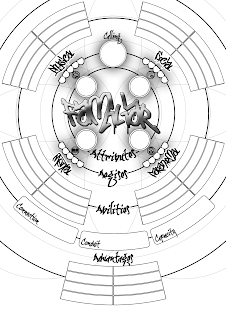NaGaDeMon / RoleVember 2019 - Eureka
I'm not going to get this project finished during the NaGaDeMon / RoleVember month, but I've certainly made a lot of headway, and the game is a lot more focused that it was before. Over the past couple of days I've been refining the spellcasting system, and that's a bit of a "make-or-break" element when the premise of the game involves casting spells, invoking effects, or otherwise bending reality. In two earlier posts, I shared how magic is rated in a character , and the procedure for invoking mystical effects in the game , but the last couple of days have been dedicated to generating a system where characters can invoke mystical effects on the fly without needing to resort to pre-defined spells, or working out how players can develop their own mystical effects for their characters. I'd always aspired back toward Mage: the Ascension for this, but a recent Facebook thread on people's favourite magic systems prompted me to rethink this idea, and ...

